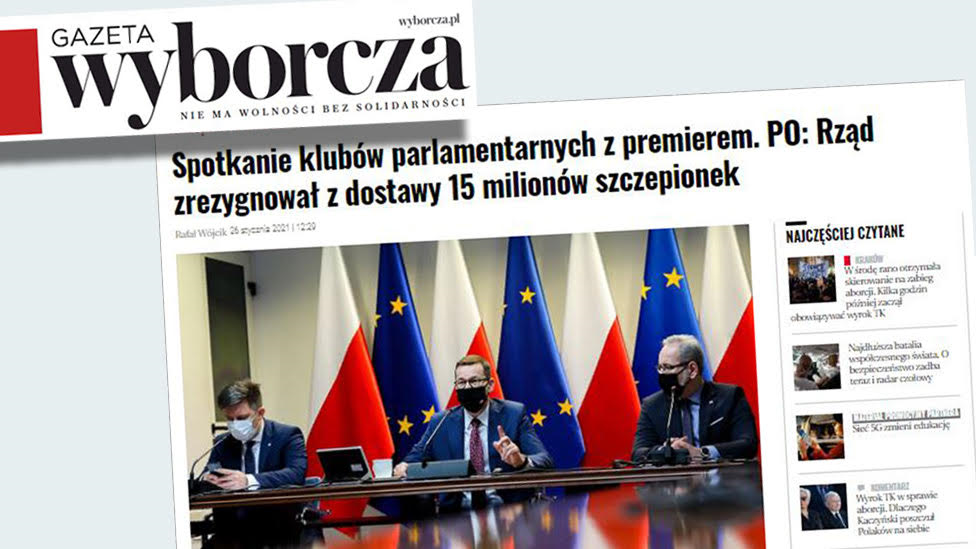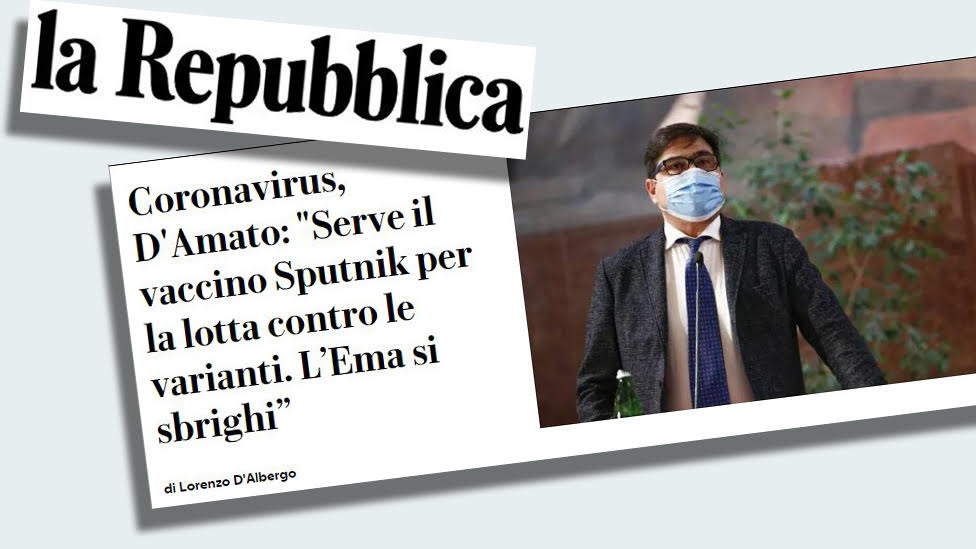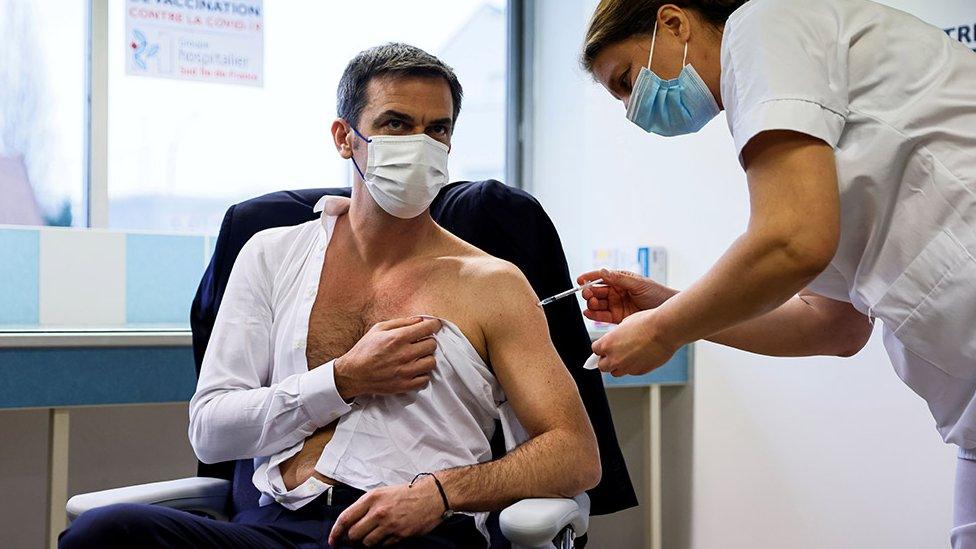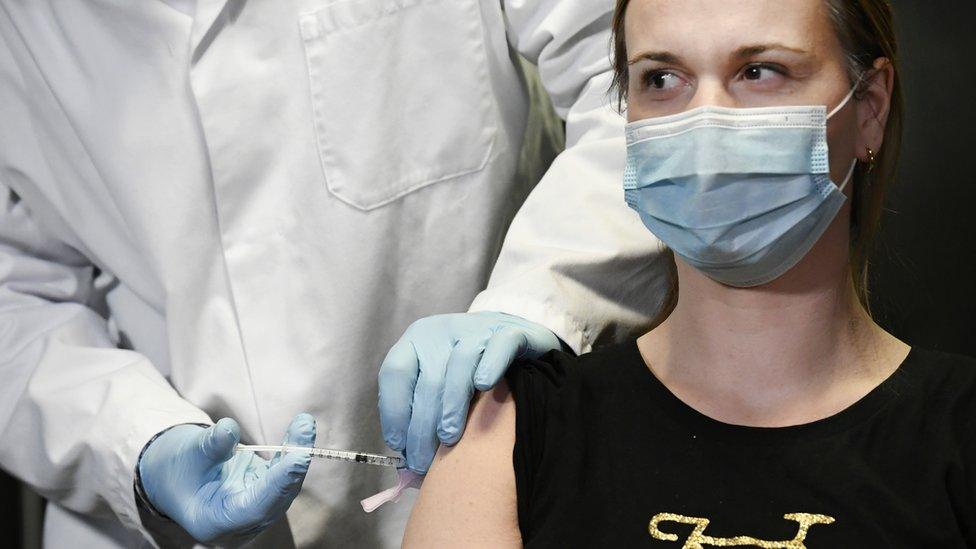EU vaccine delays prompt press frustration
- Published

The ongoing row over vaccine delays in the EU is making headlines
Latest news of delays in deliveries of the AstraZeneca and Pfizer-BioNtech vaccines to the European Union has been received with anguish and impatience from commentators and leaders across the continent.
While the EU comes in for some blame for the delays, there is also interest in looking to other companies to meet vaccination needs.
Failure 'would unleash a crisis'
Spanish daily El País says the slow rollout is a "lethal threat to the EU" and distribution poses a "political risk" for the union.
"A failure of the vaccination plan would unleash a crisis of European institutions' competence and confidence in them, which is difficult to restore."
Blame might lie with the EU for "massively overestimating" the production capacities of manufacturers and "underestimating" the price, says German public broadcaster ZDF. "There is suspicion that manufacturers are delivering faster to countries that are paying higher prices."
Czech daily Hospodarske Noviny also pointed the finger at the EU, but added: "Production and distribution of the vaccine is simply a global business, and logistical exercise on a scale that humankind has not yet experienced. And it would be a surprise if everything went smoothly."
"Everyone has a right to the vaccine, and the best way to guarantee this right is to remain calm - politically, economically and individually," urges Belgium's Le Soir.
Russian vaccine 'could be life-saving'
The idea of buying vaccines from elsewhere has been gaining ground in some parts of Europe.
Hungary controversially decided to buy Russia's Sputnik V vaccine before it has received EU approval but now pro-government papers are weighing in. Magyar Hirlap argues that the Russian vaccine "could be life-saving" and Magyar Nemzet says failure to get vaccines on time "could take hundreds of thousands of lives". But left-wing daily Nepszava accuses Prime Minister Viktor Orban of using the vaccine policy for his own political ends, so that he "can say with a sly smile, you see, we have won again, we have just managed to overtake Brussels at the revolving door."
Croatian Prime Minister Andrej Plenkovic says "Covid-19 vaccine diplomacy is turning into vaccine hijacking", but he's stated that Croatia has not yet turned towards other vaccine manufacturers, due to the agreement stipulating that EU member states would not contact manufacturers themselves.
On the possibility that Russia and China might step in to provide their own vaccines, Czech Prime Minister Andrej Babis said "if they want to supply a vaccine to the EU, they need to ask the EMA [for approval]".
'Race against spread of mutations'
Polish Health Minister Adam Niedzielski has said that, though his government "has no alternative plans to procure vaccines", there are more reasons to buy additional vaccines, as producers do not always honour their commitments, according to Gazeta Wyborcza.

The Polish government was "analysing various opportunities, but the matter is rather delicate, so we cannot share any details", it quoted him as saying.
Romanian news outlet Krónika suggests Hungary's decision to buy the Russian vaccine is entirely justifiable in the face of supply issues. "The Hungarian leadership has at least made an effort to find a solution to the crisis," the outlet said.
Calls for a more diverse vaccine provision are not limited to Central and Eastern Europe.
In Italy, where the government said it would take legal action against Pfizer and AstraZeneca over the delays, the regional head of the department of health for Rome said the Sputnik V vaccine was "needed" and that the European Medicines Agency should approve it.
"This isn't about geopolitics: it's a race against the spread of the mutations," Alessio D'Amato said.

Related topics
- Published21 June 2021

- Published23 January 2021

- Published22 January 2021